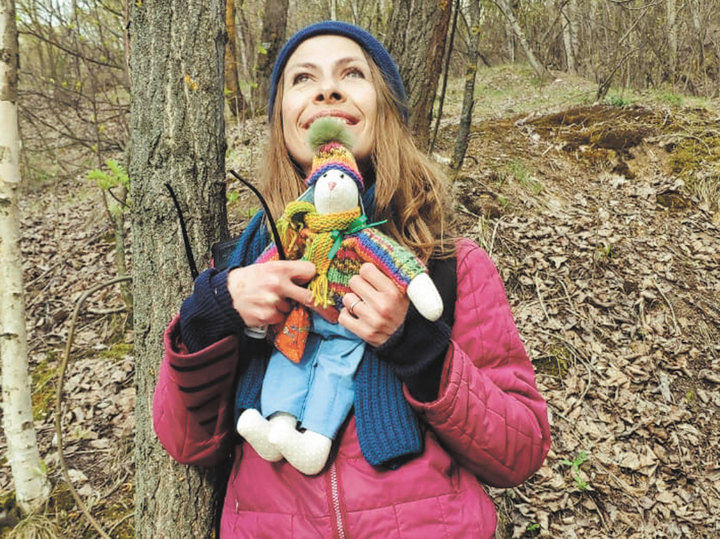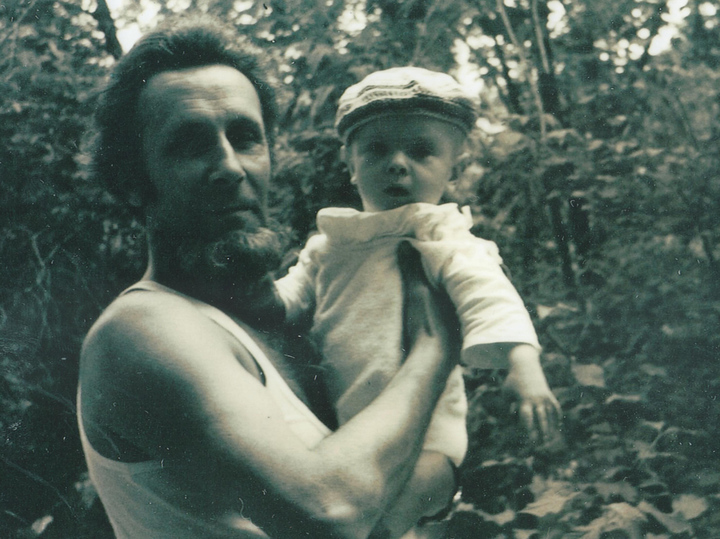Sasha Nikolaenko wrote a book about people who turn the lives of loved ones into hell
[ad_1]
— Sasha, I guess that you were dumbfounded by the prize, thematically connected with the name of Leo Tolstoy. But I want to clarify a detail: did you receive a secret “chain letter” in advance or did you not suspect anything until the last minute?
— My publisher, editor, and all my friends fought for the book until the last second. But the fact of the matter is that when you sit there, you don’t know anything, and the ceremony is long. Last time my “Heavenly Postman…” was shortlisted. This, I admit, is not a test for the faint of heart.
I was really rooting for the book this time. And when they announced me, my legs gave way. If Vladimir Tolstoy (chairman of the award jury, great-great-grandson of the writer) had not started speaking, I would have been speechless there and would have simply stood there in silence.
— Part of your book was published by the literary magazine Ural. Is this a tribute to the Soviet tradition, when before publication the so-called magazine version was printed under a separate cover?
– No, my novel is huge, and one chapter was published in Ural, and another in Novy Mir. It was for this that the editors of NM awarded me the prize for the best prose publication in 2022. But the book itself has been around for a long time. I wrote it for a very long time, and different versions ended up in magazines. It was “Ural”, by the way, that brought “The Ant God” to “Yasnaya Polyana”. Thank them very much!
If I look back at the story I told in the novel and the reason for writing it, I always had one question for God. To the God of the Old Testament. God who blesses one nation, God who exterminates and punishes, God who is cruel.
“And her God was more terrible than darkness, than blackness, a robber, an asp, an orphanage, a police force, an auk. Than everything that is scary, everything that is and is not, than death, and after death he tormented a person, judged him, boiled him in cauldrons, “skinned him,” and fried him, and tortured him. The only hope is that He does not exist.”
For such a God, questions for people who thirst and seek justice actually arise by themselves. Take, for example, the episode where Jacob dresses up in his brother’s clothes and goes to deceive his blind father – and immediately becomes God’s Chosen One.
My story in literature began with the search for justice, the search for a good God, a loving God, not punishing, but sacrificial, giving and bestowing. It was started by Fedya Bulkin (the novel “Heavenly Postman Fedya Bulkin”), the antipode of Petrusha from “The Ant God”.
Fedya asks God: why did you take away my parents? Are there not enough people for you? Why did you take my cat away (she was killed by dogs in the book). In “The Heavenly Postman,” a boy in his arguments goes so far as to take a board, place a stone on one side, jump to the other so that the stone flies to the “evil” God, who has taken away his loved ones, but the stone that flies up falls on his head.

“But in the world of Fedya Bulkin and his grandmother, it is clear that God is love.
— Grandmother and grandson love each other, the loss of loved ones united them. They feel good together – and this saves them. God Fedya and his grandmother are not dead. There are no dead people in my life either. My departed are alive, my love for them has not diminished. And their love is always with me.
“And another artistic space was needed to tell about this Love apophatically, that is, to say not what God-Love is, but the opposite.
— The second book grew out of my personal observations, from the surrounding cruelty of the world, from the inability of people to feel the pain of others.
I once walked past the hostel, and a woman there made a beautiful garden. Roses are blooming at her house. And so she’s fiddling around there, I say: “How beautiful yours is.” And she bent down to the ground. I ask: “What are you doing?” She: “I’m scattering semolina for the ants.”
I thought: what a kind woman, not only did she grow flowers, she also feeds insects. But she explained why semolina is needed, I think you know. It swells inside the ants and they all burst. Can you imagine what a monstrous death this is?
Petrusha was born from such pictures from life.
— Why was it necessary to place the Abrahamic God in the space of dachas near Moscow and sun-drenched childhood?
– It was summer for them – the grandmother in “The Ant God” and her grandson Petya. They had his generosity. They had a garden, but they turned it into hell. We humans are very good at this.
I expected only one reaction to this novel: “God is not like that”! She expected everyone to see the God in whom the old woman believed and be horrified. They will not want to be such gods, nor such old women.
I didn’t expect such a reaction right away. There were a lot of reviews, they talked about style, language, they asked me how I achieved such recognition, who I copied the dialogues from, where I got the speech of the characters. But that wasn’t the key. At the end of the novel there are the words: “God is Love, the history of the earth is just the sum of everything we have done without love.”

— Is it possible to consider the world where Petrusha, left alone with nature, lives and manages the lives of insects, a reference to Golding’s “Lord of the Flies”? Which classic child character do your boys look back to? Tom Sawyer? Dick Sand from Verne’s Fifteen-Year-Old Captain?
— If we talk about Fyodor Bulkin, then this is Mark Twain, and “Chick’s Childhood,” and “The Summer of the Lord.” This is all the light that I managed to preserve within myself after living. “The Ant God” is all the darkness I’m struggling with.
The darkness of the horror of death, the fear of punishment, the desire to survive. “Salvation is in the saved,” says my new hero Ivan Alekseevich Dyatlov. I will repeat after him.
The boy from “The Ant God” is unlike anyone else and at the same time similar to all the children of my generation. He explores the world, looks at butterflies and grasshoppers, plans boats on a workbench, but, alas, this knowledge takes place in the world of his grandmother. This old woman is the concentration of our entire post-revolutionary existence. Women raised in war, Stalin’s camps, hunger, horror and fear. They brought into life children of the same age as me (Sasha Nikolaenko was born in 1976. — I.V.), horror before God. They feared him themselves and taught him to fear us.
— So you belong to Petrusha’s generation?
“Both me and his dacha friend Sasha, that’s all of us, children before perestroika and the shootout, children after and before the war. But my book is not about an individual person or a generation, it is a requiem to humanity, which turns life into hell.
— At some point, we forget our little selves, childhood simply disintegrates into muddy spots of memories, and only a writer can reassemble the whole picture. Do you remember yourself as a child?
– I remember very well. Summer dacha childhood is alive in me…
“The spacious world, drunk with rain, as if jokingly locked by a crooked fence, sparkled and sparkled, breathed warm, sang, crackled, knocked, creaked, chirped, was. The humming, flying, singing, crawling warlike kingdom was in a hurry to live, and the bumblebee was buzzing – not “buzz,” but alive.
The outlines of the stone masses changed in the sky like soft clay, as if someone had really sculpted and crumpled them, and between the snow ridges carved by the sun, such blueness looked into the eyes… Looked from above, above the height.”
I remember I had a friend Anya, our adventures with her – hiking, launching boats – became the basis of the adventures of Petrusha and Sasha.

— Did the copy of the painting “The Death of Pompeii” hanging over Petrusha’s country bed in the novel actually exist?
— There was an illustration in my mother’s Pinakothek, I looked at it in horror for hours. It was clear to me that they would all die, I was endlessly scared and very sorry for them.
And my hero, falling asleep under this picture, “looks gloomily at the rectangle of Pompeii’s death in the frame behind the glass” and out the dark window and again thinks about how people are trying to shield themselves, to hide, but understands that they will still be burned by this inevitable fire.
“God won’t help, dad would help. Hold yourself tight. Don’t get out to look at the cat, the mouse, sticking its nose out of the corner, how the light of the lamp leans towards the boards, how people die behind the glass, cannot get out of it, flee in their blazing hell last summer, the year before and now. Breaking the glass would be it.”
— In the mind of this old woman, did Sodom and Gomorrah merge with the ancient Roman city? In general, “biblical history, absolutely,” as Medinsky would say.
– Yes. Here, for example, is one of the dialogues between an old woman and her grandson:
“- The glass, Petya, should have been wiped from Sodom, damn it, it’s completely dusty.
– Why Sodom, ba, – Pompeii?
“Sodom, Gomorrah, Admah, Seboim, Zoar were above the Dead Sea, and they overthrew them for ruins, and fire and brimstone poured from heaven, and smoke rose from the lands like the smoke of a stove…
– And he brought them out?
– A?
– Where there is milk and honey…
-Did you drink milk?
– Yes.
“So don’t expect flies, wash the glass.”
And this led to the fact that Petrusha ended up near an anthill during a walk. I saw how his shadow fell on him and felt like a “god.” They didn’t notice him – he first crushed one with his fingers, then the other. They don’t notice. Then he poured kerosene into a can in the barn, took newspapers and matches from the restroom…
“God struck a match. At the same moment, rivers of fire rushed from the mountain towards the ant streams. The tongues snaked and flowed, shimmering, down. The heavy earthen tent, engulfed in fire, sighed and began to move. Whistling like a bullet, someone escaped from the hell of the ant shower, another, another. The goosebumps writhed, curled into commas, froze, and the tongues swallowed and then spat them out. Through the smoke he saw a terrible city, scorched by the heat…”
But I categorically refuse to believe in a God who kills. He gave life to everything and all of us. He created this ant and loves his creation. To lead to this idea, I wrote my book.
[ad_2]
Source link






